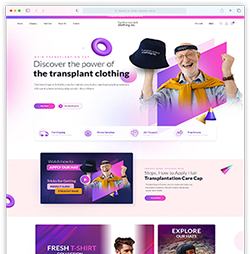
We Love to hear you back
Contact US
HR Department




.webp?width=732&height=428&name=image%20(36).webp)
In the expansive universe of web development, front-end developers stand as architects of digital experiences, meticulously shaping the interface that users interact with. Their role is pivotal, transcending mere code to weave together aesthetics, functionality, and user-centric design principles. In this article, we delve into the realm of front-end developer, exploring its significance, core skills, evolving technologies, and the indispensable role it plays in the digital landscape.
They are the creative minds behind the aesthetic appeal, functionality, and usability of websites and web applications. While often overshadowed by the complexity of back-end development, the importance of front-end developers cannot be overstated. They play a role in bridging the gap between design and functionality, ultimately crafting user-centric interfaces that drive engagement and satisfaction. Here's why front-end developers are indispensable in today's digital age.
 Understanding Front-End Development
Understanding Front-End DevelopmentFront-end development, often referred to as client-side development, is the practice of crafting the visual elements and user interface of a website. It encompasses the translation of design concepts into interactive interfaces using a combination of HTML, CSS, and JavaScript. Front-end developers collaborate closely with designers and back-end developers to ensure seamless integration of the user-facing elements with the underlying functionality and data.

A proficient front-end developer possesses a diverse skill set that extends beyond coding prowess. While proficiency in HTML, CSS, and JavaScript forms the foundation, expertise in responsive design, accessibility standards, and cross-browser compatibility is equally essential. Moreover, a keen eye for design aesthetics, an understanding of user experience principles, and proficiency in version control systems, including Git, are invaluable assets. Effective communication skills are also crucial, facilitating collaboration with designers, back-end developers, and other stakeholders throughout the development process.
The landscape of front-end development is constantly evolving, driven by advancements in technology. Additionally, CSS preprocessors like Sass and LESS streamline styling workflows, while task runners like Gulp and Webpack automate mundane tasks, enhancing productivity and efficiency. The rise of progressive web apps and single-page applications (SPAs) underscores the growing emphasis on performance, responsiveness, and seamless user experiences across devices.

Front-end development presents a myriad of challenges, ranging from browser inconsistencies and device fragmentation to performance optimization and accessibility compliance. Keeping pace with the instant evolution of web technologies requires continuous learning and adaptation. However, these challenges also present opportunities for innovation and creativity. The advent of new technologies such as WebAssembly, CSS Grid, and responsive design frameworks empowers front-end developers to push the boundaries of what is possible, fostering a culture of experimentation and exploration.
In today's digital landscape, where user experience reigns supreme, the role of front-end development has never been more critical. A well-crafted user interface can make the difference between a mediocre website and a compelling digital experience that captivates and engages users. From e-commerce platforms and social media networks to enterprise applications and multimedia content, front-end developers play a pivotal role in shaping the way we interact with the digital world.

Front-end developers are tasked with translating design mockups and wireframes into interactive, responsive, and visually captivating interfaces. They utilize a combination of HTML, CSS, and JavaScript to bring static designs to life, ensuring seamless navigation and intuitive user interactions. By understanding user behavior and design principles, they optimize layouts, animations, and micro-interactions to enhance usability and engagement. Whether it's a sleek e-commerce platform, a dynamic social media feed, or a user-friendly mobile app, front-end developers play a pivotal role in captivating and retaining users' attention.
In today's multi-device world, ensuring cross-platform compatibility is essential for reaching a diverse audience. Front-end developers are proficient in responsive web design techniques, enabling websites and applications to adapt seamlessly to various screen sizes and resolutions. They employ flexible grids, media queries, and scalable images to create fluid and consistent experiences across desktops, tablets, and smartphones. By prioritizing accessibility and performance, front-end developers ensure that users can access content and functionality effortlessly, regardless of the device they're using.

Performance and accessibility are paramount considerations in web development, influencing user satisfaction and search engine rankings. Front-end developers optimize code, assets, and resources to minimize loading times and improve site speed. They leverage techniques such as code minification, lazy loading, and caching to enhance performance and streamline the user experience. Additionally, front-end developers prioritize accessibility by adhering to web standards and implementing features that accommodate users with disabilities. From semantic HTML markup to keyboard navigation and screen reader compatibility, they ensure that websites and applications are inclusive and usable for everyone.
Front-end development is inherently collaborative, requiring close coordination with designers, back-end developers, and other stakeholders. Front-end developers act as intermediaries between design and development teams, translating design concepts into functional code while advocating for best practices and technical feasibility. They participate in design reviews, brainstorming sessions, and agile ceremonies to align project objectives and deliverables. By fostering open communication and teamwork, front-end developers contribute to cohesive and harmonious workflows, ultimately delivering polished products that exceed expectations.
The field of front-end development is constantly evolving, driven by technology and shifts in user expectations. Front-end developers are lifelong learners, continuously exploring new tools, frameworks, and libraries to stay abreast of industry trends. From responsive frameworks like Bootstrap and Foundation to JavaScript libraries like React and Vue.js, they leverage cutting-edge technologies to enhance productivity and innovation. Moreover, front-end developers embrace emerging standards such as Progressive Web Apps (PWAs) and WebAssembly, paving the way for richer and more immersive web experiences.
In today's digital landscape, front-end developers are the architects of user-centric experiences, blending creativity with technical prowess to shape the future of the web. From crafting engaging interfaces to ensuring cross-platform compatibility and optimizing performance, their contributions are integral to the success of digital products and services. By embracing collaboration, innovation, and continuous learning, front-end developers play a vital role in driving user satisfaction, business growth, and technological advancement. As the digital realm evolves, the importance of front-end developers will only continue to grow, shaping the way we interact with technology for years to come.
Front-end developer is both an art and a science, blending technical expertise with creative flair to craft immersive and intuitive user experiences. As technology continues to involve and user expectations evolve, the role of front-end developers will remain indispensable in shaping the digital landscape. By staying abreast of emerging technologies, mastering core skills, and embracing a user-centric approach, front-end developers will continue to drive creation and push the edges of what is possible in the realm of web development.


If you want to convert traffic into real leads, then optimizing the local search for your business is the ideal tool...
You should initially decide to pick a platform for operating your website if you plan on starting an online business...